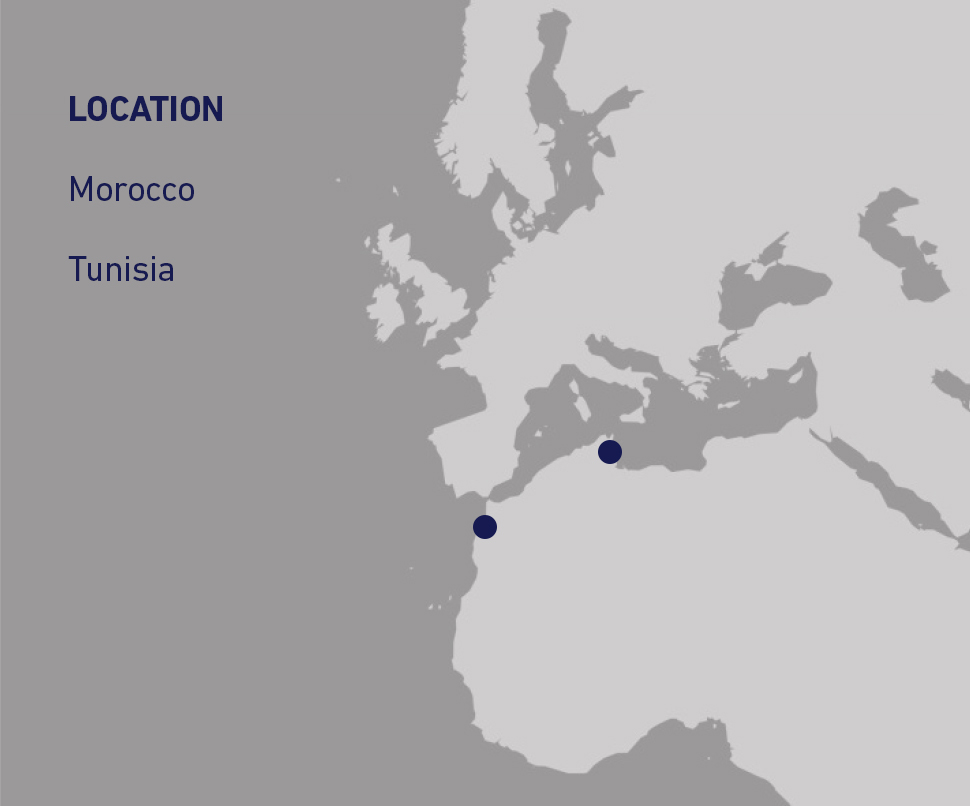
FLOWER – Fostering Local market Opportunities for Women’s Empowerment and Resilience
Context and objectives
6.5 million women in Morocco work in rural food production, and 1.8 million in Tunisia; more than half of these women are informal workers without a contract, and therefore without access to social protection, healthcare or formal structures that would allow them to benefit from governmental support in the face of the COVID-19 pandemic.
The agricultural sector has been particularly affected by the pandemic due to the limitation of the movement of people and goods, the closure of usual markets and points of sale, and changes in consumer practices, including apprehension towards products whose production cannot be traced. This has further exacerbated many women’s risk of job loss, poverty and disease.
The FLOWER project will increase women workers’ awareness of their socio-economic rights, of the health risks of the pandemic, and of the opportunities available in terms of law, funds and functioning of the market, in order to achieve better working conditions, production processes, quality and hygiene of food products, distribution channels and access to local and national markets. It will also train young local coaches on mechanisms of funds access and business management, and enable women’s groups to become familiar with economic, commercial and financial approaches to crisis management.
Location

Key facts
Promoter:
ES.Maroc.org
Duration:
9 months
Partners:
COSPE
CAWTAR
Total cost:
€375,000
Beneficiaries
- At least 300 members of women’s production groups (5 groups per region and an average of 10 members per group).
- At least 20 young coaches (10 in Tunisia and 10 in Morocco) working on entrepreneurship mentoring and coaching, strengthening their skills in management, governance, and financial education for rural women’s groups.
Key actions
Identification and diagnosis of working conditions of women in rural areas, and the effects of the COVID-19 pandemic, including focus groups, interviews and surveys.
Creation of a cluster of local trainers, and training delivered on: socio-economic rights; social security and work security to avoid risks in the workplace; business management and improvement of product quality; financial and savings management, economic modelling, self-organized funding mechanisms and mechanisms of access to private and state funds; technical assistance to improve production processes, quality and hygiene of food products; marketing and communication. Young coaches will be affiliated to local hubs and incubators, and so will strengthen the skills and expertise of the wider community through a cascade effect.
Economic and commercial support to make economic activities more profitable and sustainable: improving hygiene of production, packaging and distribution, with support for the realization of new packaging lines; sanitary management and working conditions in times of pandemic; opening opportunities in local and national markets; promoting new ways of sale such as short sales circuits, online sales and distribution in quality grocery stores; creating innovative business opportunities to counterbalance the prohibition of open-air fairs and markets; consolidating groups in health and financial management to create adequate market opportunities through the identification of short distribution channels; creating understanding of the commercial mechanisms of the territory and partnerships with existing digital platforms and local shops; nationwide marketing and sponsorship of fine/medium retail/grocery stores.
Creation of working groups to support the formalization of informal groups and the creation of solidarity collectives.
Expected results
Increased empowerment and socio-economic resilience of women working in rural areas in Tunisia and Morocco, with access to new market opportunities both nationally and online.
Increased sustainability of women’s production groups in terms of governance, production processes and protection measures for workers.

